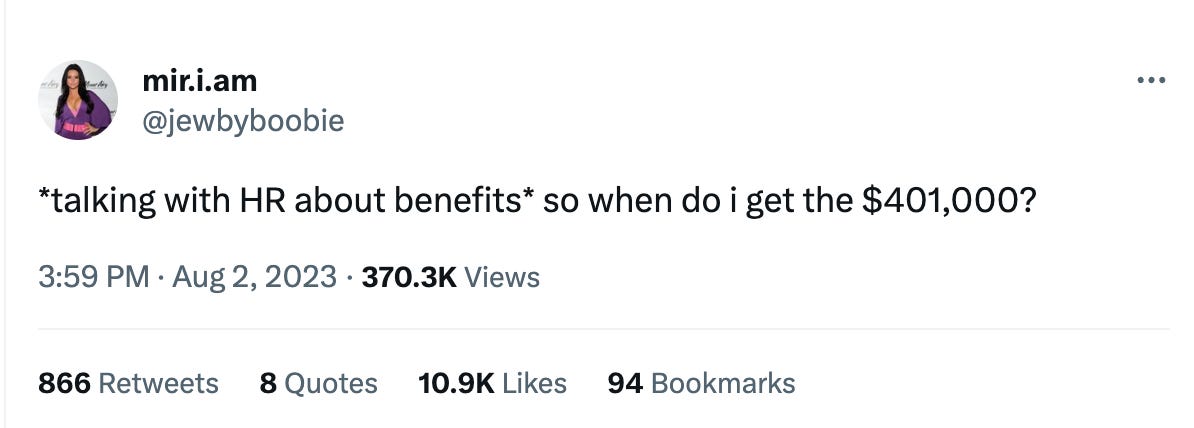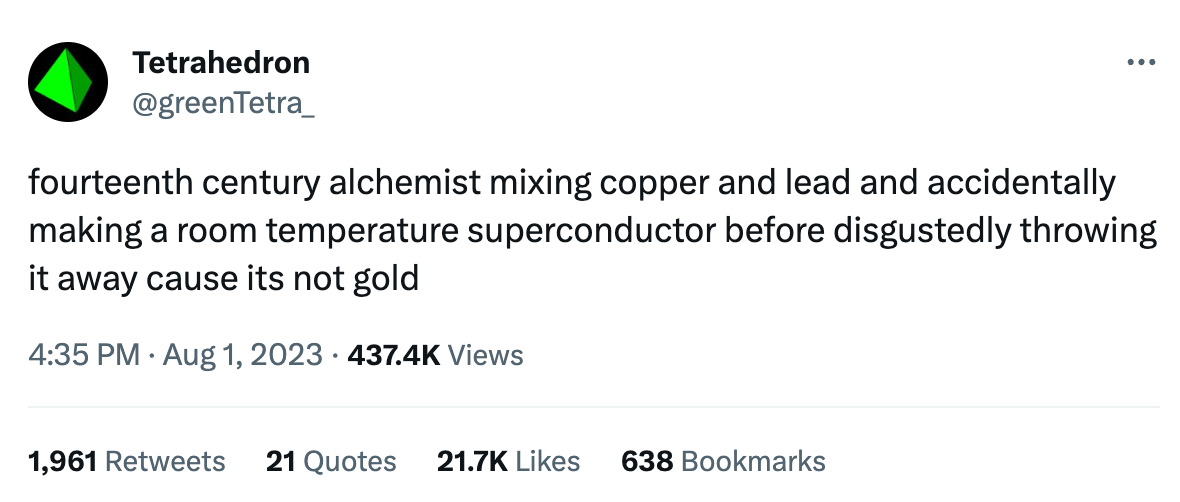How the Kids Online Safety Act puts us all at risk
Anti-speech laws are spreading from states to Congress, and the future of online speech could hang in the balance

Today let’s talk about a right we currently take for granted that may soon disappear: the ability to browse and post to most websites anonymously.
In May, Utah became the second state to enact a law requiring adult websites to verify the identities of their users. The law requires websites that host porn to use one of several methods to ensure visitors are 18 years or older, including state-issued digital IDs and third-party age verification services. Those services use a range of verification tools, including age estimation based on the user’s face and uploading a government ID.
The law originated from reasonable concerns that most websites do almost nothing to prevent minors from accessing porn online. But as written, it also discourages adults from using these sites — the stigma around watching porn means that very few people want their face or government name linked to their browsing on a site like Pornhub. (The fact that verification companies are supposed to delete user data after verification hasn’t provided much comfort, since how will anyone know if they’re following through?)
To the anti-porn Republican supermajority of the Utah legislature, this broader challenge to adult websites is undoubtedly a happy byproduct of the law. So, too, is the fact that one of the leading adult websites, Pornhub, went dark in Utah in protest of the new law.
This isn’t the first time the US government has sought to restrict access to adult content by requiring websites to verify users’ ages. In 1998, the Child Online Protection Act similarly attempted to enforce age verification schemes. But after 10 years of litigation, the Supreme Court refused to hear the government’s final appeal that the law was unconstitutional.
The reason is that the First Amendment prevents the government from weighing in on what kinds of content might be “harmful to minors.” In particular, courts observed that materials that might harm a young child would not harm a 17-year-old. The one-size-fits-all strategy, the court decided, chilled too much speech.
That outcome should cheer anyone who hopes that the Utah law and others like it are eventually thrown out. But this week, privacy advocates lost their first attempt in district court — and for a disturbing reason.
It turns out that Utah crafted its law using lessons from recent Republican victories in abortion cases. Instead of compelling the state to act against porn providers, Utah’s law empowers private citizens to sue them. The result is what the director of the advocacy group the Free Speech Coalition has called “an end run around the First Amendment.”
And for now, it’s working.
Here’s Sam Metz in the Associated Press:
U.S. District Court Judge Ted Stewart did not address the group’s arguments that the law unfairly discriminates against certain kinds of speech, violates the First Amendment rights of porn providers and intrudes on the privacy of individuals who want to view sexually explicit materials.
Dismissing their lawsuit on Tuesday, he instead said they couldn’t sue Utah officials because of how the law calls for age verification to be enforced. The law doesn’t direct the state to pursue or prosecute adult websites and instead gives Utah residents the power to sue them and collect damages if they don’t take precautions to verify their users’ ages.
If this strategy sounds familiar, it’s because it’s the same one Texas used in its 2021 law to prohibit abortions at around six weeks. The Supreme Court upheld that law, making it a model for state legislatures to curtail other freedoms.
And as anti-porn legislation gains ground, lawmakers are turning their attention to the broader web. Earlier this year the Utah government passed the Utah Social Media Regulation Acts, which require everyone to verify their age before creating an account on a social network. Minors under the age of 18 need parental permission to use social media, and their parents must be granted full access to their accounts.
That’s a blow to the autonomy and privacy rights of older teens. It also puts at risk LGBT minors, who were once able to use social networks to connect with other queer youth in the face of disapproval or abuse from their parents. They’ll now have a much harder time doing so.
But it’s not just teens who will suffer. Adults who are forced to upload their government identification to an endless string of websites will almost certainly one day find themselves victims of a future data breach in which hackers obtain that data and sell it on the open market.
And it’s not just Utah, either. The revived Kids Online Safety Act (KOSA) would take some of the same ideas from state legislation and take them national.
Chief among these ideas is that social platforms must soon take additional steps to protect minors — a requirement that will likely force them to undertake age verification measures similar to Utah’s.
It’s true that after significant pushback, Congress watered down the bill’s verification provisions. But as Mike Masnick notes at TechDirt, the law is written in a vague enough manner that platforms will likely feel compelled to adopt verification schemes anyway. (TechDirt has covered KOSA in great detail since it was introduced, and its coverage is worth perusing.)
And what must platforms do after verifying their users’ ages? KOSA attempts to create a “duty of care,” holding companies responsible for harms that minors may experience after encountering speech on them.
“This duty of care directly requires platforms to protect against the harmful effects of speech, the overwhelming majority of which is constitutionally protected,” wrote Ari Cohn, a First Amendment lawyer at the think tank Tech Freedom, in a letter to senators supporting the bill.
Cohn goes on to explain why we can’t put platforms in charge of determining what might harm a minor:
Platforms cannot “prevent and mitigate” the complex psychological issues that arise from circumstances across an individual’s entire life, which may manifest in their online activity. These circumstances mean that material harmful to one minor may be helpful or even lifesaving to another, particularly when it concerns eating disorders, self-harm, drug use, and bullying. Minors are individuals, with differing needs, emotions, and predispositions. Yet KOSA would require platforms to undertake an unworkable one-size-fits-all approach to deeply personal issues, thus ultimately serving the best interests of no minors.
Again, courts have routinely refused to impose such vague, expansive, and inherently unmeetable duties of care on disseminators of expression, holding that doing so would unacceptably chill First Amendment activity. 18 Indeed, because platforms cannot reasonably anticipate or individually account for the different ways each minor will experience, interact with, or be impacted by content, KOSA’s duty of care “provide[s] no recognizable standard . . . to follow.”
Given how differently individuals respond to different kinds of content, it’s not clear to me how a duty of care would make kids safer. But it seems fairly obvious how it could put them at risk.
The reason: Another plank of the bill would allow state attorneys general to sue platforms if they believe that minors have been harmed. Right-wing groups are already agitating to use this provision to sue platforms for showing minors content involving transgender people. Should KOSA become law, I imagine it will be mere weeks before the attorney general of Texas, Florida, or another red state sues Meta, Google, and other tech giants simply for making trans content available to minors.
Making good internet law requires carefully balancing equities. And I’m sympathetic to the idea that platforms ought to do more to protect young people, particularly around content that may negatively affect their mental health.
But the equities here are way off kilter. Lawmakers are quickly advancing an anti-sex, anti-speech agenda in which every adult user of the internet could soon find themself entangled.
A decade ago, the Supreme Court could mostly be assumed to keep laws like this in check. But the Roberts Court shows increasingly little regard for precedent — and some justices are openly craving retribution against the platforms on speech-related issues.
Over the past half decade, Congress has failed to pass much better pieces of platform regulation. It would be a shame if lawmakers’ first big swing at improving internet safety in years came at the expense at the speech rights of every single person using a platform.

On the podcast this week: By popular demand, we walk through the science of room-temperature superconductors and what they might mean for future technology. Then, Kevin and I debate the finer points of KOSA. And finally, a round of HatGPT.
Apple | Spotify | Stitcher | Amazon | Google
Governing
- The Biden administration and lawmakers are approaching AI regulation across four key areas: policy, new government agencies, funding for AI safety research, and immigration. (Dylan Matthews / Vox)
- Google said demand for its Perspective API, an AI classifier designed to flag toxic online speech, has shot through the roof, with generative AI firms needing it to police chatbot text and other AI output. (Alex Pasternack / Fast Company)
- French news agency AFP sued X, the company formerly known as Twitter, for refusing to discuss payment for licensing the company’s content per a 2019 copyright rule. Elon Musk criticized AFP in a post, calling the demand “bizarre.” For once I agree with him. (Reuters)
- Canadian academic Michael Geist argues that the result of the country’s Online News Act is that all parties — Canadian citizens, news publishers, and lawmakers in addition to Meta and Google — stand to lose. (Michael Geist)
- Kenya suspended the local activities of biometric crypto project Worldcoin to allow government agencies to assess potential data security and privacy risks. (Bhargav Acharya and Humphrey Malalo / Reuters)
- Microsoft researchers said they have evidence that Russia-linked hackers impersonated Teams technical support staff to try and steal corporate login credentials from dozens of companies. (Zeba Siddiqui / Reuters)
- Google is launching a new dashboard for Google Search that will make it easier to know when personal information like your phone number or address can be found in results and request the info be removed. (Kris Holt / Engadget)
- Twitch banned an additional two online casino sites from from being streamed on its platform, and said its policy change around gambling has resulted in a 75% decline in related viewership. (Haleluya Hadero / Associated Press)
- Instagram imposed new restrictions on direct messaging that now let strangers send only one, text-based message to someone who doesn’t follow them. Instagram wants to protect users from unwanted images and videos. (Aisha Malik / TechCrunch)
Industry
- Google said its AI Search Generative Experience will now feature more images and video in results, and the company is also working on making the summary box appear faster. (David Pierce / The Verge)
- Kickstarter said new projects relying on generative AI technology to generate media assets like images or music will have to disclose this on the product page starting later this month. (Kyle Wiggers / TechCrunch)
- Meta released a new open-source generative AI tool called AudioCraft that can turn text prompts into music, thanks to a combination of three different underlying models. (Emilia David / The Verge)
- Under 10% of the 300,000 people who bought Meta’s Ray-Ban smart glasses are still actively using the device as of February 2023, according to internal company metrics. (Salvador Rodriguez and Joanna Stern / WSJ)
- Roblox said its Meta Quest app has been downloaded “well over” 1 million times since its open beta launch last week. (Jay Peters / The Verge)
- Meta is teaming up with the UFC to stream mixed martial arts fights to its Horizon Worlds VR platform. Sounds like a perfect place to watch two billionaires fight in a cage match. (Jay Peters / The Verge)
- New data on Meta’s Threads indicate that daily active users are down 82% from the app’s post-launch high, to just 8 million users. Time to ship that web app. (Brian Fung / CNN)
- Hacking collective Cult of the Dead Cow plans to reveal a new coding framework at DefCon this month that will let developers build apps with strong encryption and protections against data collection. The project, called Veilid, draws inspiration from BitTorrent, Signal and Tor. (Joseph Menn / The Washington Post)
- X added a new feature for Blue subscribers that lets them hide the blue checkmark on their profile and conceal that they pay for the service. It appears that all the mean memes about latter-day blue checks worked. (Ivan Mehta / TechCrunch)
- X CEO Linda Yaccarino changed her username on the platform to include the new company name, only for a troll to quickly snatch up her old handle and turn it into a parody account. An unfortunate yaccident. (Thomas Germain / Gizmodo)
- Writer Amanda Marcotte argues that rightwing provocateurs have been resorting to more extreme measures to generate controversy in the face of a diminishing left-leaning audience on X. (Amanda Marcotte / Salon)
- Microsoft announced a new feature for its Discord integration on Xbox that will let players stream their gameplay to friends through the app. (Tom Warren / The Verge)
Those good tweets
For more good tweets every day, follow Casey’s Instagram stories.

(Link)

(Link)

(Link)
Talk to us
Send us tips, comments, questions, and sensible internet rules: casey@platformer.news and zoe@platformer.news.





